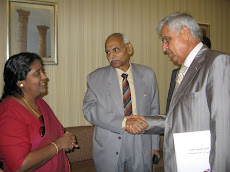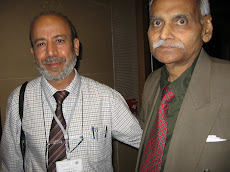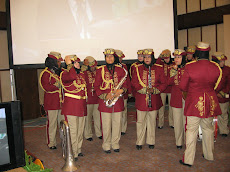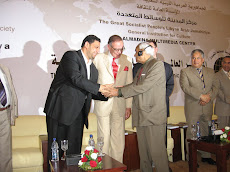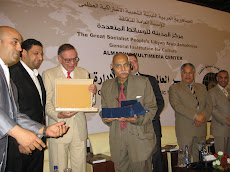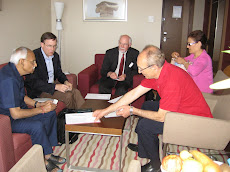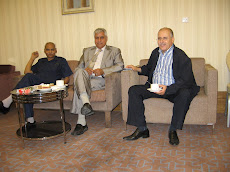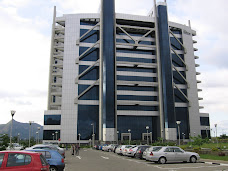India's National Knowledge Commission-2: Its Terms of Reference:
Knowledge Commission sans `knowledge worker' or `knowledge economy.'
India's National Knowledge Commission has the following terms of reference: The Commission will advise the Prime Minister on matters relating to institutions of knowledge production, knowledge use and knowledge dissemination.
The main terms of reference of the Commission, referred to as the "knowledge pentagon, include: (i) Building excellence in the educational system to meet the knowledge challenges of the 21st Century, (ii) Promote research in Science and Technology, (iii) Improve the management of institutions engaged in Intellectual
Property Rights, (iv) Promote knowledge applications in agriculture and industry, and (v) Promote the use of knowledge capabilities to make the government effective, transparent, accountable and public-oriented.
It will also explore ways in which knowledge can be made more widely accessible in India for maximum public benefit.
The danger to treat `knowledge' as a `commodity'(which it is not) to be produced (knowledge is created, not produced), used and disseminated (the natural order here is `dissemination' followed by `use' and not the other way) should be avoided by the knowledge commission. Moreover, in social and development context it is the `usable knowledge' (practical utility), which matters to the people and not the `knowledge for its own sake' (intellectual pursuit). When it has been proposed that the knowledge commission `will also explore ways in which knowledge can be made more widely accessible in India for maximum public benefit,' this term of reference presuppose existence of (usable) knowledge, which need not always be the case. The general perception is that not many 'knowledge institutions' (universities, research institutes / laboratories) have a ready storehouse of (usable) knowledge for dissemination among the people.
The main terms of reference of the knowledge commission can be grouped into five categories in brief: (i) excellence in educational system, (ii) research in science and technology, (iii) management of intellectual property rights (IPRs) institutions, (iv) knowledge applications in agriculture and industry, and (v) good governance.
These main terms of reference of the knowledge commission have two striking features. First, their inter-sectoral nature. Usually in government, such commissions or their lesser entities, (high powered) committees, are sectoral in nature, say, confined to a sector like education, agriculture, industry, etc. The multi-sectoral terms of reference of knowledge commission will require an expertise of a very high order for inter-sectoral co-ordination. The knowledge commission
as constituted at present does not have such an expertise though it does have a former member of the Indian administrative service who resigned from the service to pursue academic interests and till recently was vice chancellor, Delhi university and as such has to be treated more of a specialist rather than a generalist.
Secondly, and more importantly, India is perhaps the first and so far the only country in the world which has set up a (national) knowledge commission. This is a laudable step. The terms of reference of the knowledge commission, however, do not explicitly recognize the `knowledge worker' or `knowledge economy' or `knowledge society.' This is worrisome not only because many Indians are spearheading the
ongoing information revolution and India itself is a notable contributor to and beneficiary of the (new) `knowledge economy' but because creation of the national knowledge commission is a unique opportunity in which the knowledge commission can have a vision of Indian `knowledge society' based on `knowledge economy' and driven
by `knowledge workers' and prepare a plan of action to realize the vision in a definite time-frame. No commission, which calls itself, `knowledge' commission can afford to ignore these basic concepts, which are driving the ongoing information revolution worldwide.
Dr D.C.Misra
June 15, 2005
Wednesday, June 15, 2005
Friday, June 10, 2005
Illiterate people are using cybercafes in India, reports a research study
Illiterate people are using cybercafes in India without any special programs or applications for them, reports a research study. Haseloff,* a doctoral student at the University of Augsburg, Germany in his ongoing research study on "Cybercafes and their Potential as Community Development Tools in India" reports, among other things, that "it is a positive sign that currently some illiterate people are using cybercafes for a variety of reasons, without any special programs or applications for them being in place." His study, however, rejects the claim that cybercafes bridge the digital divide. According to him: "it appears that cybercafes according to the categories age, employment and education mostly serve the better-off groups (the young, the highly educated and the higher income groups). These findings confirm the results from the street survey, where Internet use could be measured only among the middle and upper-classes. Therefore, the theoretical assumption that cybercafes might help bridge the digital divide for the lowest SEC groups has to be rejected, at least at present." (Note: SEC= Socio-economic categories). His general finding is that "cybercafes play a significantly different role in India, compared to the role they play in the most developed countries. Whereas in developed countries, they are just an additional access point for people who already have access somewhere else, they seem to be highly important for the middle class in India, and therefore effectively help to bridge the digital divide for this group." Haseloff needs to be complimented for undertaking this policy-relevant study.Dr
D.C.Misra
June 10, 2005 _____________________________________________________________________________________
*Haseloff, Anikar M. (2005): Cybercafes and their Potential as Community Development Tools in India, The Journal of Community Informatics, Volume 1 Number 3 (2005), http://www.ci-journal.net/viewarticle.php?id=68&layout=html(accessed: June 10, 2005)
D.C.Misra
June 10, 2005 _____________________________________________________________________________________
*Haseloff, Anikar M. (2005): Cybercafes and their Potential as Community Development Tools in India, The Journal of Community Informatics, Volume 1 Number 3 (2005), http://www.ci-journal.net/viewarticle.php?id=68&layout=html(accessed: June 10, 2005)
Wednesday, June 08, 2005
Review of Virmani (2005): Institutions, Governance and Policy Reform
Occasional Paper Review: Review of Virmani, Arvind (2005): Institutions, Governance and Policy Reform: A Framework for Analysis, Economic and Political Weekly, Mumbai, India, May 28-June 4.
_____________________________________________________________________________________
Abstract:* “The literature on institutions and development has dealt with questions of grand design such as the Constitution, the rule of law (personal safety), property rights and informal rules embodied in culture. These are matters that happen on a time scale of a quarter/half century or more and can be thought of as the 'superstructure' of institutions. The quantitative work on institutions and growth has explored the linkage between these institutional issues and economic growth. The current paper focuses on what may be called the 'microstructure' of institutions, a smaller scale at which change can occur over a time frame of decades (or half decades). Among the issues that arise in this context are how changing institutions require changes in policies.”
Dr D.C.Misra
June 8, 2005
____________________________________________________________________________________
*Virmani, Arvind (2005): Institutions, Governance and Policy Reform: A Framework for Analysis, Economic and Political Weekly, Mumbai, India, May 28-June 4, http://www.epw.org.in/showArticles.php?root=2005&leaf=05&filename=8714&filetype=html
(accessed: June 8, 2005)
_____________________________________________________________________________________
Abstract:* “The literature on institutions and development has dealt with questions of grand design such as the Constitution, the rule of law (personal safety), property rights and informal rules embodied in culture. These are matters that happen on a time scale of a quarter/half century or more and can be thought of as the 'superstructure' of institutions. The quantitative work on institutions and growth has explored the linkage between these institutional issues and economic growth. The current paper focuses on what may be called the 'microstructure' of institutions, a smaller scale at which change can occur over a time frame of decades (or half decades). Among the issues that arise in this context are how changing institutions require changes in policies.”
Dr D.C.Misra
June 8, 2005
____________________________________________________________________________________
*Virmani, Arvind (2005): Institutions, Governance and Policy Reform: A Framework for Analysis, Economic and Political Weekly, Mumbai, India, May 28-June 4, http://www.epw.org.in/showArticles.php?root=2005&leaf=05&filename=8714&filetype=html
(accessed: June 8, 2005)
Sunday, June 05, 2005
Review of Torres et al. (2005): E-Government and E-Governance Developments in EU Cities
Review of Torres, Lourdes, Vicente Pina and Basilio Acerete (2005): E-Government and E-Governance Developments in EU Cities Reshaping Government Relation to Citizens
Torres et al. (2005)* report that "ICTs have not had a dramatic impact on the practical reality of present politics. The Internet represents an aid to good governance by increasing government transparency, efficiency, and customer-oriented service delivery, but it is not running, in most cases, as an important medium facilitating citizen consultation, policy discussion, or other aspects of citizen participation in the policymaking process." Their study shows that "technology is behaving as an enabler within pre-existingsocial structures and political functions. In the European continental countries the application of ICTs to service delivery has little effect on the traditional administration style of their countries. Furthermore, there is a systematic bias in local government ICT policy which not only confirms existing emphases upon service provision but also sustains and enhances it."
Their findings are based on a comprehensive study of the nature of e-governance initiatives by 35 cities with more than 500,000 inhabitants in 12 European countries - Austria, Belgium, France, Germany, Greece, Ireland, Italy, Luxembourg, The Netherlands, Portugal, Spain and the UK, which represent around 80 per cent of EU population. Their empirical survey focuses on "e-services and e-democracy together with the web maturity." The study was carried out "during the second half of 2003 and the first half of 2004and a range of 173 items of information were analysed, 67 services delivered through the Internet were identified and grouped according to the local public service classification carried out by Torres and Pina as well as 67 e-democracy features and 6 web maturity items.This is an important study, which should not be missed by any one interested in e-governance.
Torres et al. need to be complimented for not only undertaking this comprehensive cross-country study but for drawing clear conclusions which have important lessons of practical utility for e-governance policy-makers and implementers worldwide. Their conclusion, for example, "At present most e-government initiatives are still viewing people from a passive perspective -to whom something is given or from whom something is required-, and not as citizens" rings true as the state and citizens continue to co-exist in mutual discomfort. As the potential of e-governance continues to be unrealized worldwide, the study implies need for re-orientation of e-governance strategies to serve the citizens better. The authors rightly emphasise that "The jump fromadministratively oriented towards user-oriented organizations requires to give citizens the opportunity to influence and mould information which only transact level permits." E-Governance, it appears, has a long way to go.Dr
D.C.Misra
June 5, 2005
___________________________________________________________________________________
*Torres, Lourdes, Vicente Pina and Basilio Acerete (2005): E-Government and E-Governance Developments in EU Cities Reshaping Government Relation to Citizens, Zaragoza, Spain, University of Zaragoza, Faculty of Economics and Business Administration, Department of Accounting and Finance, Paper presented at the 28th European Accounting Association Annual Congress, Göteborg, May18-20, 2005, available http://www.uc3m.es/uc3m/dpto/EMP/seminar/torres.pdf(accessed: June 5, 2005)
Torres et al. (2005)* report that "ICTs have not had a dramatic impact on the practical reality of present politics. The Internet represents an aid to good governance by increasing government transparency, efficiency, and customer-oriented service delivery, but it is not running, in most cases, as an important medium facilitating citizen consultation, policy discussion, or other aspects of citizen participation in the policymaking process." Their study shows that "technology is behaving as an enabler within pre-existingsocial structures and political functions. In the European continental countries the application of ICTs to service delivery has little effect on the traditional administration style of their countries. Furthermore, there is a systematic bias in local government ICT policy which not only confirms existing emphases upon service provision but also sustains and enhances it."
Their findings are based on a comprehensive study of the nature of e-governance initiatives by 35 cities with more than 500,000 inhabitants in 12 European countries - Austria, Belgium, France, Germany, Greece, Ireland, Italy, Luxembourg, The Netherlands, Portugal, Spain and the UK, which represent around 80 per cent of EU population. Their empirical survey focuses on "e-services and e-democracy together with the web maturity." The study was carried out "during the second half of 2003 and the first half of 2004and a range of 173 items of information were analysed, 67 services delivered through the Internet were identified and grouped according to the local public service classification carried out by Torres and Pina as well as 67 e-democracy features and 6 web maturity items.This is an important study, which should not be missed by any one interested in e-governance.
Torres et al. need to be complimented for not only undertaking this comprehensive cross-country study but for drawing clear conclusions which have important lessons of practical utility for e-governance policy-makers and implementers worldwide. Their conclusion, for example, "At present most e-government initiatives are still viewing people from a passive perspective -to whom something is given or from whom something is required-, and not as citizens" rings true as the state and citizens continue to co-exist in mutual discomfort. As the potential of e-governance continues to be unrealized worldwide, the study implies need for re-orientation of e-governance strategies to serve the citizens better. The authors rightly emphasise that "The jump fromadministratively oriented towards user-oriented organizations requires to give citizens the opportunity to influence and mould information which only transact level permits." E-Governance, it appears, has a long way to go.Dr
D.C.Misra
June 5, 2005
___________________________________________________________________________________
*Torres, Lourdes, Vicente Pina and Basilio Acerete (2005): E-Government and E-Governance Developments in EU Cities Reshaping Government Relation to Citizens, Zaragoza, Spain, University of Zaragoza, Faculty of Economics and Business Administration, Department of Accounting and Finance, Paper presented at the 28th European Accounting Association Annual Congress, Göteborg, May18-20, 2005, available http://www.uc3m.es/uc3m/dpto/EMP/seminar/torres.pdf(accessed: June 5, 2005)
Subscribe to:
Posts (Atom)






